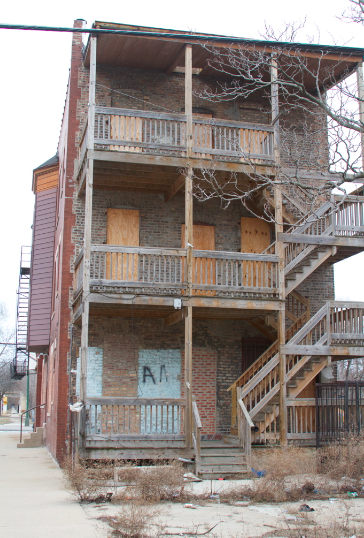City tackles crime with demolitions
By Susie An

City tackles crime with demolitions
By Susie AnCarl Carpenter has lived most of his 41 years in Englewood, starting at a time when the area was full of houses. But things have changed.
“Every other block, you’ve got anywhere between 5 to 6 vacant lots,” he said.
Some of those vacancies were part of collaboration between the Chicago Police Department and Department of Buildings to demolish structurally unsound properties that also bred criminal activity. About 300 buildings were knocked down in the last year.
Carpenter, who lives with relatives in the South Side neighborhood, doesn’t think the plan is a real solution to curb crime.
“If that’s the best you can do, stop playing,” he said. “That ain’t fixing to do nothing. What’s that going to stop?”
Carpenter said the strategy of tearing down vacant homes makes it harder for low-income residents who may live in the foreclosed or abandoned properties.
“There’s people who live there,” he said. “You gonna force them to be homeless and force them into crime?”
The Chicago Police Department said in the target area of the 3rd, 7th, 8th, 10th and 11th police districts, overall crime has dropped.
In the police district that covers Englewood, murders and overall crime are both down 19 percent from last year. Shootings are down 38 percent.
More than 100 properties in the area were demolished during this time.
Leo Schmitz is the deputy chief of the 7th district. He said gang members use vacant buildings on strategic blocks to store either narcotics or weapons.

“Whether it’s boarding it up, whether it’s fixing it up and getting new tenants in, all of that is brought to the table before demolition is performed,” he said.
Asiaha Butler is the founder of Resident Association of Greater Englewood (R.A.G.E.) She said her organization works with the 7th district often.
“I know the CAPS officers,” she said. “They’re doing a lot of great work. I don’t know how strategic the plans are overall [that I] can say is making a huge impact on the community.”
Butler is a property owner on a block with very few neighbors. She doesn’t like to see demolitions.
“But at the same time you don’t want to have havens where people can do criminal activity,” she said. “I definitely see a fast track of the demolishing of buildings. I don’t necessarily see a fast track in curing the criminal activity that’s happening there.”
She said there needs to be more collaboration among residents, police and organizations for a plan to work.
“The city said they’re gonna do this, but we on the block know that something else needs to happen,” she said.
Butler said part of that is getting people to invest in properties in the community. She’s hopeful that the market is slowly turning around.
In another part of Englewood, litter collects against some abandoned chairs in a large empty lot. A family that lives across the street is just arriving home.
A 19-year-old resident who didn’t want to give his real name said to call him Big Homie. He says new streetlights and more secured buildings make his block feel safer.
He remembers his uncle living in the house across the street before it was demolished. He points out a large boarded up apartment building on the block.
“It was a good place at one point, but the gangs took over,” he said. “But it’s done now. They boarded everything up.”
Susie An is WBEZ’s business reporter. Follow her @soosieon.